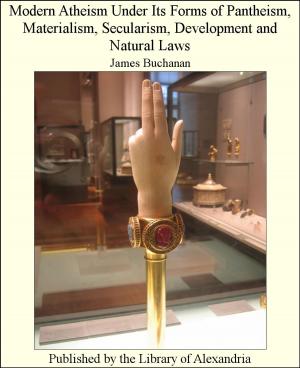The Court of the Empress Josephine
Nonfiction, Religion & Spirituality, New Age, History, Fiction & Literature| Author: | Baron Arthur Léon | ISBN: | 9781465511096 |
| Publisher: | Library of Alexandria | Publication: | March 8, 2015 |
| Imprint: | Language: | English |
| Author: | Baron Arthur Léon |
| ISBN: | 9781465511096 |
| Publisher: | Library of Alexandria |
| Publication: | March 8, 2015 |
| Imprint: | |
| Language: | English |
Two-thirds of my life is passed, why should I so distress myself about what remains? The most brilliant fortune does not deserve all the trouble I take, the pettiness I detect in myself, or the humiliations and shame I endure; thirty years will destroy those giants of power which can be seen only by raising the head; we shall disappear, I who am so petty, and those whom I regard so eagerly, from whom I expected all my greatness. The most desirable of all blessings is repose, seclusion, a little spot we can call our own." When La Bruyère expressed himself so bitterly, when he spoke of the court "which satisfies no one," but "prevents one from being satisfied anywhere else," of the court, "that country where the joys are visible but false, and the sorrows hidden, but real," he had before him the brilliant Palace of Versailles, the unrivalled glory of the Sun King, a monarchy which thought itself immovable and eternal. What would he say in this century when dynasties fail like autumn leaves, and it takes much less than thirty years to destroy the giants of power; when the exile of to-day repeats to the exile of the morrow the motto of the churchyard: Hodie mihi, eras tibi? What would this Christian philosopher say at a time when royal and imperial palaces have been like caravansaries through which sovereigns have passed like travellers, when their brief resting-places have been consumed by the blaze of petroleum and are now but a heap of ashes? The study of any court is sure to teach wisdom and indifference to human glories. In our France of the nineteenth century, fickle as it has been, inconstant, fertile in revolutions, recantations, and changes of every sort, this lesson is more impressive than it has been at any period of our history. Never has Providence shown more clearly the nothingness of this world's grandeur and magnificence. Never has the saying of Ecclesiastes been more exactly verified: "Vanity of vanities; all is vanity!" We have before us the task of describing one of the most sumptuous courts that has ever existed, and of reviewing splendors all the more brilliant for their brevity.
Two-thirds of my life is passed, why should I so distress myself about what remains? The most brilliant fortune does not deserve all the trouble I take, the pettiness I detect in myself, or the humiliations and shame I endure; thirty years will destroy those giants of power which can be seen only by raising the head; we shall disappear, I who am so petty, and those whom I regard so eagerly, from whom I expected all my greatness. The most desirable of all blessings is repose, seclusion, a little spot we can call our own." When La Bruyère expressed himself so bitterly, when he spoke of the court "which satisfies no one," but "prevents one from being satisfied anywhere else," of the court, "that country where the joys are visible but false, and the sorrows hidden, but real," he had before him the brilliant Palace of Versailles, the unrivalled glory of the Sun King, a monarchy which thought itself immovable and eternal. What would he say in this century when dynasties fail like autumn leaves, and it takes much less than thirty years to destroy the giants of power; when the exile of to-day repeats to the exile of the morrow the motto of the churchyard: Hodie mihi, eras tibi? What would this Christian philosopher say at a time when royal and imperial palaces have been like caravansaries through which sovereigns have passed like travellers, when their brief resting-places have been consumed by the blaze of petroleum and are now but a heap of ashes? The study of any court is sure to teach wisdom and indifference to human glories. In our France of the nineteenth century, fickle as it has been, inconstant, fertile in revolutions, recantations, and changes of every sort, this lesson is more impressive than it has been at any period of our history. Never has Providence shown more clearly the nothingness of this world's grandeur and magnificence. Never has the saying of Ecclesiastes been more exactly verified: "Vanity of vanities; all is vanity!" We have before us the task of describing one of the most sumptuous courts that has ever existed, and of reviewing splendors all the more brilliant for their brevity.















